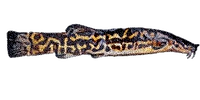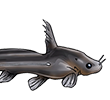Hello:
I have been fortunate enough to have my zebras finally breeding, and rather than pulling fry out of the cave, I have left the second batch in with dad...
the first batch was small, and I was able to pull 3 babies from the cave.
I have them in a frykeeper in the main tank, so filtered from the parents water.
I know they have grown some, but not significantly, or at least not as much as I had hoped.
I know they are slow to grow, I have not seem them eating with vigor when I put food in...
I have used micro worms, Live BBS, and some prepared foods, although as mentioned, it does not seem like they are eating with any enthusiasm.
Can you mention anything else I can try to see if I can get them eating better....
obviously they have eaten something to have lived this long (born around middle of jan) but just wondering if there is a golden bullet idea for them..
thanks for any help...
oh second batch has at least eight in the cave... but not sure how many exactly.
thanks
juvenile L-46's What food is best
-
ClearSky57
- Posts: 77
- Joined: 08 Dec 2009, 02:13
- My cats species list: 3 (i:0, k:0)
- Spotted: 3
- Location 2: Mid-Atlantic, USA
- TwoTankAmin
- Posts: 1478
- Joined: 24 Apr 2008, 23:26
- I've donated: $4288.00!
- My cats species list: 6 (i:0, k:0)
- My BLogs: 2 (i:0, p:48)
- Location 1: USA
- Location 2: Mt. Kisco, NY
- Interests: Fish and Poker
Re: juvenile L-46's What food is best
A few observations here.
I have always tried to leave offspring free to grow in the breeder tank. They seem to do so faster this way as opposed to in a trap or growout tank. However, one must provide small hiding places that are fry sized, this will help a lot.
I have read, and tend to feed accordingly, that young zebras have a greater need for veggie matter than they do when older. I have always fed some amount of veggie/algae ingredients in any case. These fish are omnivores with a liking for meaty stuff but omnivore means not just meat.
Next, there is a saying that "a happy zebra is a hiding zebra." I wonder if keeping them in a trap and exposed to a lot of light might be stressing yours some? I use no lights over zebra tanks except when I am cleaning the tank or catching the fish. I use a small flashlight to check caves.
As for feeding fry, there are two basic "methods", imo. The first is tiny fry specialized foods such as bbs, cyclop-eeze, etc. Things too tiny for bigger fish but perfectly sized for fry. The other are larger foods which do not need to be consumed whole. And example would be an earthworm or veggie stick. It sinks and softens which lets tiny fry eat bits from it. Anything that does this can be used as long as it suits their dietary needs. What one want to avoid are things like blood worms or tubifex which get eaten whole but larger fish but which can cause fry to choke to death if they try to feed on them.
I will also add frozen daphnia to the diet of offspring once they gain a bit of size.
I am sure others here may chime in with how they deal with their zebras which should give you a few good ideas as to what you may want to try.
One last offering, you might want to read this short study: Growth performance of the zebra pleco (Hypancistrus zebra) with different food sources.
http://ainfo.cnptia.embrapa.br/digital/ ... rneiro.pdf
I cannot attest to its accuracy, draw your own conclusions.
I have always tried to leave offspring free to grow in the breeder tank. They seem to do so faster this way as opposed to in a trap or growout tank. However, one must provide small hiding places that are fry sized, this will help a lot.
I have read, and tend to feed accordingly, that young zebras have a greater need for veggie matter than they do when older. I have always fed some amount of veggie/algae ingredients in any case. These fish are omnivores with a liking for meaty stuff but omnivore means not just meat.
Next, there is a saying that "a happy zebra is a hiding zebra." I wonder if keeping them in a trap and exposed to a lot of light might be stressing yours some? I use no lights over zebra tanks except when I am cleaning the tank or catching the fish. I use a small flashlight to check caves.
As for feeding fry, there are two basic "methods", imo. The first is tiny fry specialized foods such as bbs, cyclop-eeze, etc. Things too tiny for bigger fish but perfectly sized for fry. The other are larger foods which do not need to be consumed whole. And example would be an earthworm or veggie stick. It sinks and softens which lets tiny fry eat bits from it. Anything that does this can be used as long as it suits their dietary needs. What one want to avoid are things like blood worms or tubifex which get eaten whole but larger fish but which can cause fry to choke to death if they try to feed on them.
I will also add frozen daphnia to the diet of offspring once they gain a bit of size.
I am sure others here may chime in with how they deal with their zebras which should give you a few good ideas as to what you may want to try.
One last offering, you might want to read this short study: Growth performance of the zebra pleco (Hypancistrus zebra) with different food sources.
http://ainfo.cnptia.embrapa.br/digital/ ... rneiro.pdf
I cannot attest to its accuracy, draw your own conclusions.
“No one has ever become poor by giving.” Anonymous
“Everyone is entitled to his own opinion, but not to his own facts.”" Daniel Patrick Moynihan
"The good thing about science is that it’s true whether or not you believe in it." Neil DeGrasse Tyson
“Everyone is entitled to his own opinion, but not to his own facts.”" Daniel Patrick Moynihan
"The good thing about science is that it’s true whether or not you believe in it." Neil DeGrasse Tyson




